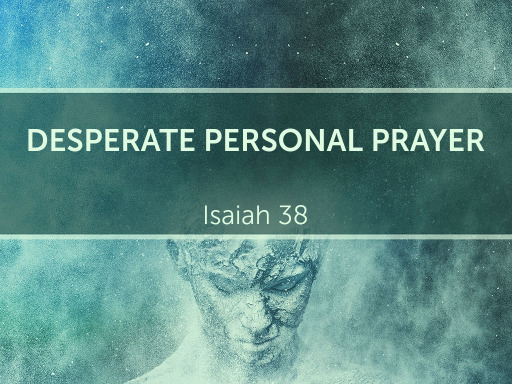Desperate Personal Prayer

Sermon • Submitted • Presented • 45:24
0 ratings
· 2,659 viewsFiles
Notes
Transcript
Sermon Tone Analysis
A
D
F
J
S
Emotion
A
C
T
Language
O
C
E
A
E
Social
Continuing the theme of Hezekiah’s prayer life, we find another episode here in chapter 38.
We also catch a glimpse of the fact that Isaiah is not always chronological
In chapter 37 we saw Sennacherib’s end, but in this chapter, he is still alive and in play.
I want to simply walk through this passage and let it speak for itself.
Hezekiah Had a Big Problem
Hezekiah Had a Big Problem
In those days Hezekiah became terminally ill. The prophet Isaiah son of Amoz came and said to him, “This is what the Lord says: ‘Put your affairs in order, for you are about to die; you will not recover.’ ”
terminally ill
about to die
will not recover
Hezekiah Became Depressed
Hezekiah Became Depressed
Then Hezekiah turned his face to the wall and prayed to the Lord.
He said, “Please, Lord, remember how I have walked before You faithfully and wholeheartedly, and have done what pleases You.” And Hezekiah wept bitterly.
He hid his face
He did not want to look out
He wept bitterly
I don’t want to labor this too much, but I don’t think Isaiah was walking down the hallway about to leave and God turned him around. I think there was a little time here. How long I don’t know.
But he was rightfully upset. Ecclesiastes makes it clear that there is a time for everything. We should not be afraid to express sorrow over bad news. And let me remind you, Hezekiah didn’t look at Isaiah and say “ I don’t receive that. Don’t speak those negative words”
We need to give ourselves permission to have a hard time coming to terms with hard news.
I think we do people a disservice when we don’t give them time and space to process and to feel. To hurt, and to cry… then to call on the Lord.
Hezekiah Called Out to God
Hezekiah Called Out to God
He said, “Please, Lord, remember how I have walked before You faithfully and wholeheartedly, and have done what pleases You.” And Hezekiah wept bitterly.
He did not explicitly ask to live.
He simply reminded God (again God didn’t need the reminder, but Hezekiah needed to say it, and God was moved by it.
He reminded God that He had tried to honor the Lord in the way he had lived.
Hezekiah trusted in the Lord God of Israel; not one of the kings of Judah was like him, either before him or after him.
Hezekiah knows that God cares and God listens.
He knows that God can do anything He chooses.
In the previous chapter, Hezekiah prays straight up based on the promises of the Word of God, and the preaching of Isaiah… Judah would not fall to Assyria. That prayer was supplication for the Nation, this prayer is very personal.
There is no guarantee that God will intervene. But there is no reason not to cry out to God and ask Him to move, and believe that He will.
What does he have to lose? Nothing! What does he have to gain? Everything.
God Responded Powerfully
God Responded Powerfully
Then the word of the Lord came to Isaiah:
“Go and tell Hezekiah that this is what the Lord God of your ancestor David says: I have heard your prayer; I have seen your tears. Look, I am going to add 15 years to your life.
And I will deliver you and this city from the power of the king of Assyria; I will defend this city.
This is the sign to you from the Lord that He will do what He has promised:
I am going to make the sun’s shadow that goes down on Ahaz’s stairway go back by 10 steps.” So the sun’s shadow went back the 10 steps it had descended.
An extension of life by 15 year (and an heir was born during that time)
By the way, God used medicine to bring about the cure.
Now Isaiah had said, “Let them take a lump of pressed figs and apply it to his infected skin, so that he may recover.”
2. An exclusion of the enemy
3. A Sign of Certainty (God had told Ahaz to ask for a sign decades earlier, and Ahaz, full of himself, had refused) Now God uses Ahaz’s steps to turn back time as a pledge that he would do what he would do.
And Hezekiah had asked, “What is the sign that I will go up to the Lord’s temple?”
Hezekiah had asked for the sign.
Hezekiah Responded With Worship
Hezekiah Responded With Worship
starting in verse 9 and culminating in 18-20
For Sheol cannot thank You; Death cannot praise You. Those who go down to the Pit cannot hope for Your faithfulness.
The living, only the living can thank You, as I do today; a father will make Your faithfulness known to children.
The Lord will save me; we will play stringed instruments all the days of our lives at the house of the Lord.
